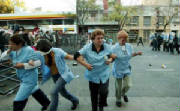|
We live at a time when the corporate model of capitalism is interfering with most institutions, even liberal democracy and
conservative social values. The triumph of corporations is something that was never inevitable, but certainly was and continues
to be the goal of many influential political strategists, (such as the neocons).
Despite this, humane economies continue to exist, and survive against great odds. When we look at the different kinds of economic,
money-based organisations that exist in our society, and how they operate, we can see quite a bit of diversity.
Small businesses exist beside co-operatives, beside mega-corporations. I believe that this corresponds to fundamentally different
social interactions.
Structurally, the economies differ according to how democratic they are: and therefore whether they help empower participants,
or if they make participants into de-humanised objects.
(NB when I say democratic I am holding up participatory democracy as the ideal, and therefore better than representative
democracy.)
Case Study: Argentina's workers co-operatives.
When Argentina's bubble economy collapsed in 2001, after the rapid introduction of free trade policies- (shock treatment administered by the IMF), workers in this
formerly comfortable middle-class country realised that their survival rested upon them directly trading with eachother to
create a parallel economy to that of the peso. It depended on collaborative work in a 'solidarity economy', based in
local innovations such as community vegetable gardens, aquaculture in disused oil storage vessels (done by the piquetero movements of unemployed workers) and workers cooperatives.
Some women in their fifties working in a suit factory called the Brukman factory decided to take their destinies into their
own hands and keep going to work even though the factory had closed down, the owner in huge debt.
Naomi Klein visited this factory. She has an awesome article here about it.
She and her husband Avi Lewis made the documentary The Take from their experiences learning from the workers here. I saw this in Melbourne in July. It was one of the most moving and
uplifting films I've ever seen. I fully recommend it to everyone. It comes out in Australia in around April 2005 I think.
A solidarity website, with downloadable films is at www.workerswithoutbosses.net

|
| Workers of the Brukman Factory |
Case Study 2: Student Housing Co-operatives in the US
Berkeley Student Co-operatives Association
Housing Co-operatives at Austin, Texas
The North American peak body for student co-ops
funding body for NASCO (above)
Co-op America
Community Economies is a site developed by two ANU economics professors collectively known as J.K. Gibson-Graham. I'll find out more about it.
(will continue)
A significant structural difference between small and big business is the legal obligation of fiduciary duty that binds big
business in obligation to the shareholders in increasing the short-term share prices.
If we asked a small business to do something that was in the interests of the community, but not their short-term profit margins,
they could, whereas the big business could not, because the shareholders could sue them for fiduciary duty. Thus big business,
once listed on the stock exchange, is trapped in a situation where ethics always must come second to profit.
This is a focus of the new film The Corporation, which highlights the legal status of corporations as human beings, then judges what kind of human being they would be. (a
psychopath).
--> Next Section
On Co-operatives: here is an e-list set up for communication, mainly between food co-operatives:
g'day to all those co operative freaks out there,
Boy oh boy is this exciting. One thing to come out of the co operatives workshop at this year's SOS is the creation of
an elist dedicated to co operatives in Oz co operating with each other. No no no, not just food co ops. ALL kinds of goodness!
This new elist lives here ozcooperatives@yahoogroups.com To join, send an `add me to this elist' to dominika AT catchnet.com.au
with your first and last name [from the email address you want things sent to]
|

